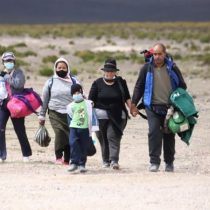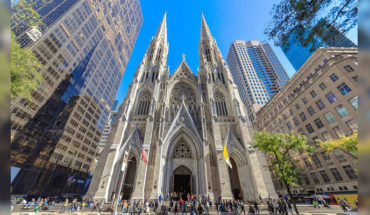
“For us Latinos, getting to Chile is like fulfilling the American dream, and I left Venezuela with a suitcase full of dreams. If I’m deported now, it would be like going back to the completely defeated past.”
Daniela* has lived in northern Chile for almost a year. He entered the South American country by an irregular passage, on the border with Peru, after walking three days through the desert, consuming only water and bread.
Arriving in the city of Arica, she continued her journey of more than 700 kilometers above a mule to reach her final destination: the little El Loa, located in the Antofagasta region.
He went in search of opportunities and found them: he got a job as a upholsterer and, with the money he manages to raise, keeps his two children, 6 and 9 years old, who remain in Venezuela in the care of their mother.
But the April 28 just past, his plan was truncated after he received a expulsion order. Now, she says, she lives in fear.
“I haven’t gotten any help, no lawyer gives me answers. And at any moment I can be detained and expelled,” he tells BBC World.
“It is very sad and painful to be in this situation. I am the livelihood of my family and I want to bring you all here because it is the only chance to give my children a better future, have education and freedom of expression; What’s going on in my country is crazy,” he adds.
New law
There are thousands of migrants in Chile who are facing a situation similar to Daniela’s.
The new immigration law which began to govern on April 20 only allows those who entered for a enabled step before March 18, 2020, the day when the government of Sebastian Piñera closed the borders for the first time as a product of the coronavirus pandemic.
Instead, those who entered clandestine by unsabling steps have a deadline of 180 days to leave the country, without sanction.
“We don’t want organized crime, smuggling, drug trafficking and those who don’t respect our laws to enter our country,” President Piñera said, enacting the law.
“Those who try to enter clandestinely, not only comment on a crime, but risk being expelled,” he added.
After almost eight years of processing in the Chilean Parliament, this new legislation arises amid the sharp increase in the migration flow that the South American country has experienced in the last 10 years.
Foreigners increased 305 thousand 2010 (which corresponded to the 1,8% of Chile’s total population) to almost 1,500,000 people 2020 (7,5% according to the Organization Jesuit Migrant Service (SJM), which collected data from the National Institute of Statistics (INE) and chile’s Department of Foreign Affairs and Migration.
This is partly explained by the explosive increase in migration Venezuelan (from a community of 8,000 in 2012 to 500,000 in 2020) and Haitian (which increased from just 1,600 people in 2012 to more than 185,000 in 2019).
INE estimates indicate that Venezuelans today are the largest group in Chile (30.5%), followed by Peruvians (15.8%) Haitians (12.5%).
The new wave of migration has been a major challenge for this nation, where counter-trial measures have had to be taken to try to adapt its integration policies towards migrants.
There have also been significant social changes: certain municipalities have even ended up changing their demographic profile due to the high concentration of foreigners, such as Santiago Centro or Independencia, where one in three residents is not of Chilean origin.
“In the face of rising migration flows, it was urgent to modernize the law we had that was absolutely obsolete,” the lawyer told BBC Mundo Pilar Hazbun, coordinator of the legislative area of the Center for Freedom and Development Studies, of which several of its researchers have collaborated with centroderecha parties and the government of Piñera.
“This new legislation has a holistic approach and includes a balance between recognizing the rights and duties of migrants, but also recognizing that the state has sovereignty to determine who enters and who doesn’t, and what the requirements are for it,” he adds.
Steps not enabled
Experts agree that Latin America suffers one deep displacement crisis caused by the precarious economic, political and social situation in several countries.
In this context, many choose to emigrate, even on foot, seeking a better future, regardless of whether or not they have permission to enter the nations they are addressing.
And Chile, despite the structural failures that revealed the social outburst that began in October 2019, remains one of the most attractive destinations.
Thus, in recent years there has been a sharp increase in people entering this country by unabling steps.
Between January 2018 and January 2021 alone, there have been more than 35,400 of this income, what the 79% of the total irregular intries since 2010, according to SJM data with information from the Investigation Police (POI).
An example of its consequences is what happened in Colchane in February of this year, when services from the small highland village collapsed after the arrival of thousands of migrants who entered Chile clandestinely, despite the low temperatures and inhospite climate of the area.
But there is another factor that is decisive in the increase in “illegal” migrants: in the last three years, Chile began to demand a “Nice hotel” people from Venezuela and Haiti, requirement that the new immigration law extended to all those who want to settle in the country, in order to prevent foreigners from entering as tourists and changing their immigration quality to look for work.
for Macarena Rodriguez, president of SJM and academic of the law school of Alberto Hurtado University, this can mean a serious problem.
“Previous visas are very difficult to get, imagine in Venezuela. And when you have desperate people, who see this as a survival route, entry through unsused steps opens up as a possibility,” he explains to BBC World.
The same opinion has the sociologist and expert in migrations, Luis Eduardo Thayer.
“People who don’t have opportunities in other countries are going to come the same to Chile because they’re going to be moved by work, the ability to get resources, so all the new Chilean rules what they’re going to end up doing is incentivize clandestine income,” he tells BBC Mundo.
However, the undersecretary of the ministry of the Interior, Juan Francisco Galli, states that the South American country had to make a decision.
“What’s better, 250 grand entering as tourists and being left in irregularity or 24 thousand entering clandestinely? I think the numbers speak for themselves; reduced the problem to a tenth. Although it’s still a problem,” he tells BBC World.
“Chile is closing the door on clandestine migration, yes. But for those who declare, from their home country, that they come to Chile to live, work or study, the doors are open,” he adds.
Juan Francisco Galli, Undersecretary of the Ministry of the Interior of Chile. IMAGE SOURCE: UNDERSECRETARIAT OF THE MINISTRY OF THE INTERIOR, CHILE
Administrative expulsions
To try to control illegal migration, apart from the requirement for consular visas, the new law to facilitate “administrative expulsions”.
Now, for a migrant to be expelled, there is no longer a need for a criminal complaint against him (which was a delay in the process). Since 20 April, the mere finding that a person entered irregularly is an argument sufficient for him to be expelled.
This is the case of Daniela, who when she stepped on Chilean territory was carDenounced hoping he might opt for a regularization of his roles. However, it was not the case and, on the contrary, he was given an expulsion order.
The Government of Piñera has been angry that it will enforce the law and for this it contracted 15 commercial aircraft that, as advanced by the authorities, will be used to return their countries to a total of 1,500 people 2021.
The first of them took off at the end of April with 55 people on board, all dressed in white overalls to prevent the contagion of covid-19. The destinedor? Caracas.
The government intends to deport a total of 1,500 foreigners by 2021. IMAGE SOURCE: GETTY IMAGES
“Contempt for human rights”
Pro-migrant organizations have strongly criticized the action, noting that it is a “humiliation” for deportees.
On May 19, experts from the United Nations (UN) they called on the Chilean government to “immediately halt plans for collective expulsions of migrants” because, they said, they have “the right to an individual assessment and to remain in the country while their situation is assessed in accordance with international human rights standards and standards.”
The UN Special Rapporteur on the human rights of migrants, Felipe González Morales, he assured BBC World that “there is a misunderstanding that sometimes occurs in states regarding deportations: they say they have a sovereign right to deport and the truth is that there are a lot of limitations to doing so.”
“The principle of non-re-res return, the roots in the country, family relations and health problems are some of them,” he explains.
The academic further notes that “when there is a great deal of deportation, migrants are stigmatized.”
“There may be a connotation of political interest because it is about sending a message at the expense of the rights of the migrant population. And it’s very difficult to use migrants as currency to meet other interests,” he says.
The new migration law facilitates administrative expulsion. IMAGE SOURCE: GETTY IMAGES
In the same line, the director of Aministía Internacional in Chile, Ana Piquer, he insisted that the expelled are not “migrants the same,” but people seeking “international protection” given the severe crisis that some of these nations, such as Venezuela, are going through.
Faced with these criticisms, Undersecretary Galli told BBC Mundo that “in Chile there are no mass or collective expulsions.”
“Each expulsion case is analyzed in itself. There is no will of the State to expel at any cost or anyone here, but the State has to give clear signals that clandestine income is not allowed in Chile, which is bad for the migrant and is bad for the country“.
On human rights questions, Galli says: “The contempt for people’s rights is given by those who encourage clandestine entry.”
The lawyer Pilar Hazbun, in the meantime, it states that the State has “the right to rule on the way they enter, the requirements for them to remain and in what cases they can be expelled”.
“You can’t have a law of openness that blinds migration without taking care of the issues,” he says.
The case of Colombia
Chile’s position contrasts with the migration policies that other countries in the region have taken to protect migrants, especially Venezuelans.
According to UNHCR, the UN refugee agency, there are 5.4 million Venezuelan refugees on different continents, one of the most important displacement crises in the world.
The main destination in Latin America is Colombia, where more than 1 million Venezuelans currently reside.
Much of them—about 1 million—are in a irregular immigration status. But in early May the government decided to start implementing a Temporary Statute of Protection in order to protect venezuela’s vulnerable migrant population.
Those who benefit from this benefit may remain on a regular basis in Colombia for a period of 10 years. The process, completely free and online, has been classified by experts as a “historical advance” towards the human rights of Venezuelans, as it will allow to have a universal register of this population and to adequately focus state aid.
For Felipe González Morales, Chile should take a similar attitude.
“It has to find ways to establish mechanisms for regularizing the migrant population. The crisis in Venezuela is real, so it’s not a matter of whether you like it or not; it’s a crisis that affects people and that’s why 5 million people have come out in the last six years. The other thing is to cover the sun with one finger”Says.
It should be remembered that Chile is one of the few Latin American countries that decided to reject the global pact on migrUN December 2018, to which 164 governments joined. The reason given at the time was that the pact clashed with Chilean standards to have a “safe, orderly and regular” migration.
“It’s a pressure cooker”
There is another figure to consider when discussing the migration issue in Chile: according to chile’s Department of Foreign Affairs and Migration, the number of visas granted for foreigners has decreased considerably in the last three years.
In 2018, for example, more than 438 thousand where while in 2020, just under 200 thousand. Final stays have also declined, from approximately 93 thousand in 2018 to 74 thousand in 2020.
According to Undersecretary Galli, this is explained by Chile’s regularization process in 2018, but also because applications have declined.
While Macarena Rodríguez agrees that there is a “significant drop” in applications, he states that this is not because of “lack of interest” but because of “difficulties” in the process.
“There’s a bureaucracy behind applications that’s tremendous and that means people can’t get immigration regularity,” he says.
“Covering reality and returning migrants to their countries is not sustainable over time,” he warns.
“This is a pressure cooker; there are people who are going to be left in Chile with no chance of regularizing because some are going to be expelled but not all. And irregularity does them very badly, you put them in a circle of informality that generates complex dynamics,” he adds.
For Luis Eduardo Thayer, the Chilean authorities are “Wrong focus” with these new restrictions.
“They are looking at the New Zealand, Australian and Canadian model. But we are in the region where migrants come from and it is not possible to have such selective and ideal control in terms of ideology,” he says.
“Its application lacks realism and context vision,” he adds, “and there is an increase in precariousness that is evident in the most marginal sectors.”
Hundreds of foreigners try to regularize their immigration status in Chile. IMAGE SOURCE: GETTY IMAGES
Discrimination and stigmatization
According to a survey by public opinion firm Cadem, the percentage of Chileans who in February this year believed that the arrival of foreigners is “bad” for their country reached a 60%.
This number represents an increase of 16 points since July 2019 (44%) and is the highest percentage since December 2016.
According to expert analysis, these results reflect something that has been in the place of Chilean society for a long time: discrimination against migrants.
“In Chile there is discrimination and racism“Thayer says.
For the academic, Chile is putting ahead a politics Immigration border, neglecting the migrant integration policy, which should consider an educational, health and territorial system appropriate to the times.
“Something very important has been set aside to prevent us from become a society that hates immigrants,” he says.
“Seeing migrants as a threat is going to make us a society without social cohesion and less egalitarian. And that’s a problem that’s getting unknew right now,” he adds.
The invisibility of irregular migrants to the state, experts say, creates a precarious situation already seen in the cities of northern and central Chile. IMAGE SOURCE: GETTY IMAGES
For its part, Patricia Rojas, president of the Venezuelan association in Chile, says there is a “media campaign to blame migration for the country’s structural problems”. “And that, for a year now, we see that it has entered the psych of Chileans.”
“If you tell people that the migrant comes to take away their jobs, that he stresses health services, that he pays no taxes, that he engages in street trade, he stigmatizes them,” he tells BBC World.
For her, the expulsions of hundreds of people are helping to increase this discrimination and even “criminalize” migrants, because on the same plane they mix those who are expelled for administrative reasons with those who are for criminal reasons.
However, it is to be seen whether with these measures the Chilean government will achieve its goal of “orhouse” and discourage illegal migration.
Alejandra*, a Venezuelan who entered the country clandestinely on January 31 together with her husband and two children, she is skeptical.
Despite the new restrictions, foreigners continue to enter Chile through unsabling steps, especially Venezuelans. IMAGE SOURCE: GETTY IMAGES
“I think the measures being taken are preventive, but it’s going to be very difficult for them to get all the Venezuelans out here.”Says.
Despite her status as an illegal, she already got a job as a supermarket replenisher in the capital, Santiago, which allowed her to lease a house for herself and her family, something she never imagined she could access so quickly.
“There are opportunities here. I’ve been to Peru before and, although it’s a country that opens the door for you to get out of the crisis in Venezuela, it doesn’t make you progress, the university degree doesn’t work for you and education isn’t good,” he says.
While acknowledging that she is afraid of being expelled, she says she and many Venezuelans are willing to do anything to remain in this nation.
“There are still a lot of people crossing. I, for example, am waiting for my mom, my sister and my four nephews.”
*Daniela and Alejandra requested anonymity of their names Complete.





